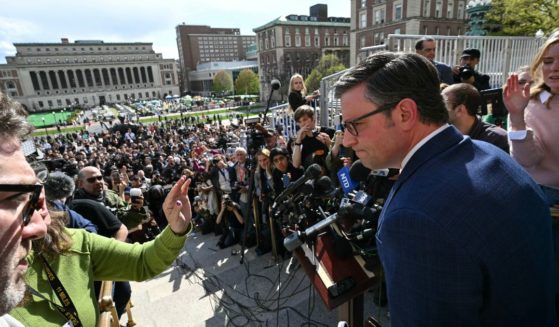Tennessee gov. says he regrets wearing Confederate uniform
NASHVILLE, Tenn. (AP) — Tennessee Gov. Bill Lee was 17 when he joined the Kappa Alpha fraternity at Auburn University, which every spring held an “Old South” party where he and other members dressed in Confederate uniforms.
The fraternity has since ended the tradition, and Lee, four decades removed from his undergraduate days at the Alabama university, says he regrets attending and wearing the uniform, and has come to see his participation in the event differently.
A spokeswoman for Lee confirmed on Thursday that Auburn’s 1980 yearbook includes a photo of the governor and another man in Confederate uniforms.
“While I never intentionally acted in an insensitive way, with 40 years of hindsight, I have come to realize that was insensitive and have come to regret that,” the Republican governor said.
The scandal involving two Virginia politicians who once wore blackface has brought renewed scrutiny to the past behavior of elected officials around the country when it comes to race. Lee’s comments came during interviews The Associated Press conducted with governors across the country following the scandal in Virginia. Comments from Lee were first reported Wednesday by The Tennessean.
Lee, who was sworn in as governor in January, spoke to the AP briefly about how he has come to view his actions. He later said through a spokeswoman that he has never worn blackface or attended parties where others were doing so, nor has he taken part in other activities or organizations since college that would be considered racially insensitive or offensive.
Kappa Alpha’s annual “Old South” parade at Auburn ended in 1992, said university spokesman Preston Sparks. The fraternity’s national organization, meanwhile, prohibited the use of Confederate flags at any chapter in 2001 and the wearing of uniforms and parades in 2010, a spokesman told the AP.
In the 1980 yearbook photo, Lee is wearing a Confederate soldier uniform and is standing with a woman in an antebellum dress. Lee’s office said it did not immediately know the identity of the woman.
Another unidentified woman and man are also in the photo wearing the same kind of outfits.
Two other photos with different people in Confederate clothing are on the page, which has the caption, “The South shall rise again, right Bill! When the band plays ‘Dixie’, a tear comes to our eyes. I’d do anything Lee, but she comes first.”
The page also explains that Kappa Alpha was based on ideals that “constituted the frame and fabric of Southern Culture” and that its founding fathers saw in Confederate Gen. Robert E. Lee “chivalry, valor, loyalty and reverence for womankind.”
Auburn’s yearbook from 1978, Lee’s freshman year, called the party sponsored by Lee’s Kappa Alpha fraternity “one of the biggest social events on campus.”
It described the festivities this way: “Preliminary parties last for a week and finally culminate on Saturday night. The sound of rebel yells and horses’ hooves can be heard as the KA’s parade down College Street – reminiscent of one of the South’s hardest, yet grandest times.”
The yearbook noted that Kappa Alpha also sponsored an event called Convivium, a celebration of Robert E. Lee’s birthday. The yearbook said he was “exemplary of the Southern gentleman” and represented attributes “that KA strives to uphold — to mold leaders not simply followers.”
Old South parties were a Kappa Alpha tradition on other campuses, including at the University of Georgia in 1983, when Georgia’s current governor, Republican Brian Kemp, was a student. Kemp was a member of a different fraternity, and there is nothing in his yearbooks to suggest he attended the parties.
Kemp did not respond to the AP survey.
Alabama Gov. Kay Ivey attended Auburn a decade earlier than Lee. Her sorority’s 1967 yearbook photo shows five members with black masks portraying “minstrels” in a rush skit, but Ivey said she is not in the photograph. Its caption reads, “Alpha Gam Minstrels welcome rushees aboard their showboat.”
The photo is on the same page as a description of the sorority and the accomplishments of its members. The page notes that Ivey was vice president of the student body.
Ivey, a Republican, said she did not recall the skit.
“When I was shown that picture, it had to be a rush skit or something at the sorority at some point in time, but no, I didn’t remember it,” she said. “I certainly wasn’t a part of it.”
Ivey said “there is no place” for blackface and that she had never worn it. When asked if she had ever made a remark perceived as racially insensitive, she replied that she hoped not.
__
Associated Press writers Meghan Hoyer in Washington; Ben Nadler in Atlanta; Kim Chandler in Montgomery, Alabama; and Kimberlee Kruesi in Nashville contributed to this report.
The Western Journal has not reviewed this Associated Press story prior to publication. Therefore, it may contain editorial bias or may in some other way not meet our normal editorial standards. It is provided to our readers as a service from The Western Journal.
Truth and Accuracy
We are committed to truth and accuracy in all of our journalism. Read our editorial standards.












